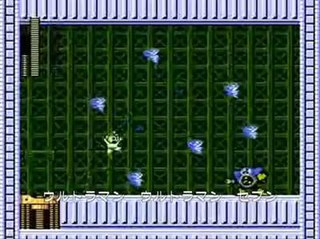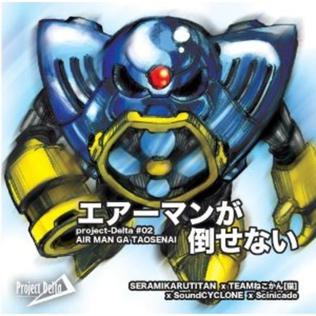
An idol is a type of entertainer marketed for image, attractiveness, and personality in Japanese pop culture. Idols are primarily singers with training in other performance skills such as acting, dancing, and modeling. Idols are commercialized through merchandise and endorsements by talent agencies, while maintaining a parasocial relationship with a financially loyal consumer fan base.

Vocaloid is a singing voice synthesizer software product. Its signal processing part was developed through a joint research project led by Kenmochi Hideki at the Pompeu Fabra University in Barcelona, Spain, in 2000 and was not originally intended to be a full commercial project. Backed by the Yamaha Corporation, it developed the software into the commercial product "Vocaloid" that was released in 2004.

William Glen Harold "Billy" Herrington, was an American model and pornographic film actor. In the late 2000s, his appearances in various gay pornography movies led him to become a popular Internet meme on video-sharing websites such as Japan's Nico Nico Douga, where he was referred to by the sobriquet "Aniki". Since then, at least 15,000 short mash-up parodies of his clips—known as "Gachimuchi Pants Wrestling" —have been produced by users.

Hatsune Miku, officially code-named CV01, is a Vocaloid software voicebank developed by Crypton Future Media and its official anthropomorphic mascot character, a 16-year-old girl with long, turquoise twintails. Miku's personification has been marketed as a virtual idol, and has performed at live virtual concerts onstage as an animated projection.
Niconico is a Japanese video-sharing service based in Tokyo, Japan. "Niconico" or "nikoniko" is the Japanese ideophone for smiling. As of 2021, Niconico is the 34th most-visited website in Japan, according to Alexa Internet.
zoome was a video hosting service in Japan managed by zoome Co., Ltd. (zoome株式会社).
An internet celebrity is an individual who has acquired or developed their fame and notability on the Internet. The growing popularity of social media provides a means for people to reach a large, global audience. Internet celebrities are found on popular online platforms such as Facebook, YouTube, Whatsapp, Instagram, TikTok, Snapchat, Myspace, OnlyFans, Telegram, Twitter, Twitch, Reddit, Discord, LinkedIn, Pinterest, Tumblr, and Threads.
Kumikyoku Nico Nico Douga is a series of video medleys, and is also the title of one of the videos in the series. The original video was created by Shimo (しも), a user of the video sharing website Nico Nico Douga.

"Omoide wa Okkusenman!" is a song that has become an Internet meme in Japan. The original song was composed by Capcom composer Takashi Tateishi as the background music for Doctor Wily's Stage in Mega Man 2 titled "Wily's Castle ", but was eventually rearranged by an individual solely known as "Blue Fang". Lyrics were later written for this version of the song, and then posted to YouTube on February 6, 2007, by the user PiggKingg and then posted in full on February 14. The song describes the singer reminiscing about his childhood and friends, particularly pretending to be Ultraman/Ultraseven with them, while realizing his life and theirs is nothing like what it used to be.

Supercell is an 11-member Japanese pop band led by musician and songwriter Ryo, which formed in 2007 as a dōjin music band. The other 10 members are artists and designers who provide illustrations in album booklets and music videos. Supercell started out by making use of the Hatsune Miku Vocaloid singing synthesizer to produce vocals for songs submitted to the Nico Nico Douga video sharing website. The popularity of the songs led the band to release their independent self-titled album Supercell (2008). Supercell later signed to Sony Music Entertainment Japan and had a professional release of their Supercell album in March 2009, which was updated with more songs.

"Air Man ga Taosenai" is a dōjin song and Internet meme from Japan. The song itself describes a player trying to defeat the boss character Air Man in Mega Man 2. Unlike the earlier song "Omoide wa Okkusenman!" which uses a song originally composed for Mega Man 2 as its melody, "Air Man ga Taosenai" is an original composition by an individual only known as "Seramikaru".

Rebecca Anne Flint, better known by her stage name Beckii Cruel, is a British YouTuber, marketing entrepreneur, and former singer. Early in her career, Flint became known for her cover dance videos on YouTube, which has reached reached 20 million upload views and over 100,000 subscribers. In 2010, one of Flint's cover dance videos went viral in Japan, and, at one point, she was the 17th most subscribed user in the country. This led to a brief idol career in Japan, where Flint released her debut single, "Tsubasa o Kudasai", and had a girl group called Cruel Angels built around her image. She later transitioned her video content to focus on fashion.

Livetune is a Japanese electro band which formed in 2007 as a dōjin music circle signed to Toy's Factory. The band originally consisted of two members, Kz and Kajuki P, but Kajuki P left the band in March 2009. Livetune started out by making use of the Hatsune Miku singing synthesizer to produce vocals for songs submitted to the Nico Nico Douga video sharing website. The popularity of the songs led the band to release the independent album Re:package at Comiket 73 in December 2007. Livetune made its major debut with Victor Entertainment with the professional release of their Re:package album in August 2008, which was updated with more songs. Livetune began collaborating with other artists in 2009, and has since composed music for such artists as Kotoko, ClariS, Maon Kurosaki, and fellow dōjin musician Ryo of Supercell.

Kenichi Maeyamada, also known as Hyadain (ヒャダイン), is a Japanese composer, lyricist, and musician. His primary work is composing anime theme songs and for J-pop musicians. He contracts through Supalove, a Japanese record label. He has released a number of anime and video game music remixes, as well as original songs. These remixes have received over 20 million hits on YouTube and Nico Nico Douga.
Hatsune Matsushima is a Japanese gravure model, talent and actress affiliated with Harmony Promotion. She was born in Tokyo, Japan. Her real name is Noriko Matsushima, and she goes by the nickname Hachu. She has starred in a number of TV dramas, films, and internet productions. She also co-authored a book.

Danceroid was a Japanese female net idol dance group affiliated with Beautiful Group talent agency. They were formed in October 2009 when they posted a video of themselves dancing to a Vocaloid song on the Nico Nico Community Group. On July 26, 2014, DANCEROID disbanded as per the wishes of the current members. This was announced on the front page of their official website, as the contracts for all the members will lapse on this date.
Piko is a male Japanese pop singer signed to the Sony Music Entertainment sub-label Ki/oon Music. He became popular on the Internet through the video sharing network Nico Nico Douga. His fans call him "Ryouseirui", a fan-made word to describe his wide vocal range that includes notes typical of both male and female voice types.

Gackpoid, is a software product developed by Internet Co., Ltd. for the Vocaloid software. His voice is sampled from Japanese singer and actor Gackt. The mascot of the software is called Camui Gackpo, after Gackt's alias name. Gackpo is also known as Gakupo, and his last name is sometimes spelt as Kamui.
Nomico is a Japanese singer. She is known for her viral cover single "Bad Apple!!" which she released with Alstroemeria Records in 2007. She is signed to the Lantis record label, and has released works which have been used in both anime and visual novels.
Keekihime, formerly known as Keekihime Yuumi, is an Austrian online streamer, YouTuber, singer, and cosplayer. In 2010, Keekihime began posting dance covers and live streaming on the Japanese video website Niconico. She was also a member of the Japanese girl group Tone Jewel from 2012 to 2013.












